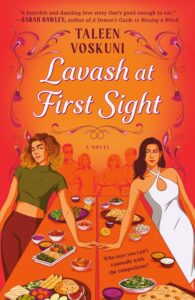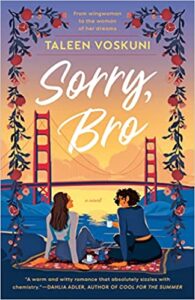Buy this from Bookshop.org to support local bookstores and the Lesbrary!
I enjoyed Sorry, Bro, Taleen Voskuni’s first novel: the main character breaks up with a non-Armenian tech bro, falls in love with an Armenian woman, and struggles with her identity as a bisexual woman. What’s not to like? I also appreciated the opportunity to learn about Armenian culture and the Bay Area Armenian diaspora.
Unfortunately, Lavash at First Sight is not as good as Sorry, Bro for one simple reason: it is too short. I am actually not bothered by the fact that the plot follows the same sequence described in the previous paragraph. What I don’t think works is that the novel reads like an extended Before Sunrise/Roman Holiday situation in which the girl has to leave home to find love on vacation.
Of course, it isn’t really a vacation–Nazeli works for a Bay Area tech company, after all. (Yes, using PTO, but still having to do work is gross, and no one should do it.) The bulk of the novel takes place at PakCon, a food packaging convention for vendors and distributors. If that doesn’t sound very Jesse and Celine, that’s because it isn’t. In between scenes at PakCon, which features an old family rivalry (yes, there’s also some Montague and Capulet action in Lavash), Nazeli and Vanya tour some of Chicago’s sights while they get to know each other. To review, there are the plot beats of Sorry, Bro, PakCon and the reality-esque competition that occurs there, family rivalry, and a Roman Chicago holiday. As I said, Lavash at First Sight needs to be longer in order to support everything Voskuni wants to include.
Two quick asides:
1) If you like your novels on the shorter side, I understand; however, you’re not often going to see me suggest than an author cut/edit. Just write more stuff for me to read!
2) It is actually kind of a Roman holiday because there is a scene set in a Roman bath. No, really, there is.
Perhaps the bigger problem is that Before Sunrise and Roman Holiday don’t have HEAs. (They don’t, and I will not be taking questions.) The plot structure of those films won’t work in a romance novel if the expectation is an HEA. It seems like Voskuni knows this and inserts the family rivalry and the competition at the food convention to give the story a place to go, but those elements belie the breeziness of Nazeli and Vanya’s budding relationship. And while we’re on the subject of too much going in too little of a page count, here seems like a good point to bring up the fact that Lavash at First Sight is a fade to black romance.
To me, none of these elements go together. Again, I think more time was needed to knit everything together in the most successful way. I liked the story, and I would have liked it better if it had time to breathe.
One thing that I really appreciated about Lavash, however, is the way that Voskuni deals with cell phones. There are text message conversations in almost every book that I’ve read this year, so my reaction to what Voskuni does definitely merits notice. Okay, now I know how this is going to sound, but hear me out: I miss long phone calls. I’m talking about the phone calls that go on for so long that you actually run out of things to say and someone falls asleep. It’s not like cell phones and texting replaced those—if anything, emails and instant messaging did. Plus, you can still call someone on a cell phone, and you don’t even have to worry about phone cords anymore.
What I’m trying to say is that I learned what “dry texting” was a couple of months ago. I mean, I already knew what it was; I just didn’t know that there was a name for it. This will come as a surprise to no one, but I don’t usually write short texts. If I send a short text, I can guarantee that something has been edited out (probably either an aside that begins with the word “also” or has parentheses around it). And, sure, in terms of texting, some people can do a lot with a little. Within the first few chapters of Lavash, we’ve seen multiple exchanges between Nazeli and the tech bro. Not a spoiler alert: he’s not one of those people. Nazeli’s first text to Vanya, on the other hand: quality flirt.
The cell phone thing is a relatively small detail, but that small detail drew me in. In a genre that is well-known for its conventions and tropes, the small details are often what make us remember a novel or an author. If it isn’t completely clear by now, I wanted more from Lavash at First Sight. That said, I still recommend it, and I will happily read whatever Voskuni writes next.
Liv (she/her) is a trans woman, a professor of English, and a reluctant Southerner. Described (charitably) as passionate and strong-willed, she loves to talk (and talk) about popular culture, queer theory, utopias, time travel, and any other topic that she has magpied over the years. You can find her on storygraph and letterboxd @livvalentine.


